Does a Security Certificate Equal a Rankings Boost?
Back in March 2014, Matt Cutts, Google’s head of Webspam, said he personally wanted SSL to be a ranking factor. Well, that time has come – and probably quicker than most people expected. Well… somewhat. As of now, adding an SSL 2048-bit key certificate will only provide a minor boost to your site. In fact, Google says it affects “fewer than 1% of global queries” and does not carry as much weight as “other signals such as high-quality content” which only goes to show you, as always, content is king.
Google has said it wants all “website owners to switch from HTTP to HTTPS to keep everyone safe on the web.” So, there is a good chance we could see that ranking signal strengthen over time.
According to Google, it will release more information on this in the future, but in the meantime, Google has provided the following tips:
- Decide the kind of certificate you need: single, multi-domain, or a wildcard certificate.
- Use 2048-bit key certificates.
- Use relative URLs for resources that reside on the same secure domain.
- Use protocol relative URLs for all other domains.
- Check out Google’s Site move article for more guidelines on how to change your website’s address.
- Do not block your HTTPS site from crawling using robots.txt.
- Allow indexing of your pages by search engines where possible. Avoid the noindex robots meta tag.
What Does This Mean in Terms of SEO?
Installing an SSL will not miraculously boost your website to the top of the search results. But, as Google continues its “HTTPS everywhere” push, it will definitely become something about which you want to remain aware. Especially if Google continues to encourage all website owners to do it.
How to Make the Switch
In order to make the switch to HTTPS your website will need a Secure Sockets Layer (SSL) Certificate. SSLs are protocols that establish a secure link between a web server and a browser. They provide a way for social security numbers, passwords, credit card numbers, and other sensitive information to transmit securely between a user and a website without being intercepted by a third party.
Purchase an SSL Through InMotion Hosting
Purchasing an SSL Certificate through InMotion Hosting takes just 5 simple steps:
Step 1. Login to AMP (Account Management Panel)
Step 2. Click the Purchase SSL Certificate button.
Step 3. Select the SSL Certificate’s subscription length (ie. 1 or 2 years) and the Desired Certificate Name.
Step 4. Enter the contact information for the owner of the SSL Certificate.
Step 5. Choose how you want the SSL billed, then click Submit. You will then see the following message: “Your order has been submitted for processing. Please look for a follow up from our staff shortly.”
The typical turn-around time is up to 48 hours. However, in some cases, an SSL may take longer to issue. Once your SSL certificate has been installed successfully, you will receive an email notification to your primary email address on file. After you get the SSL installed, you can show the Secure Comodo Seal on your website. Check out our guide on how to show the secure seal for your site.
We also have a guide with more in-depth instructions on how to purchase an SSL through InMotion Hosting.

Secure Sockets Locket (SSL) Certificate….doesn’t the L stand for *Layer*…from your blog entry…https://www.inmotionhosting.com/blog/ssl-for-seo/